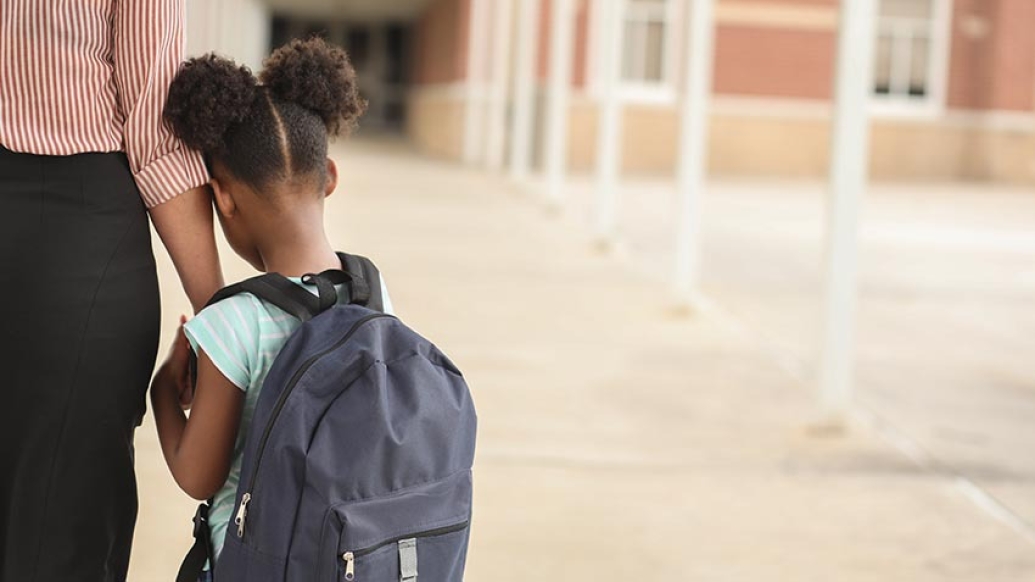They see the masks too. A pediatric psychologist offers five tips for parents on how to talk about the pandemic with their children.
8:53 AM
Author |

Editor's note: Information on the COVID-19 crisis is constantly changing. For the latest numbers and updates, keep checking the CDC's website. For the most up-to-date information from Michigan Medicine, visit the hospital's Coronavirus (COVID-19) webpage.
Interested in a COVID-19 clinical trial? Health research is critical to ending the COVID-19 pandemic. Our researchers are hard at work to find vaccines and other ways to potentially prevent and treat the disease and need your help. Sign up to be considered for a clinical trial at Michigan Medicine.
Schools are closing, family vacations are being postponed and sports games are being canceled. While this viral pandemic may feel overwhelming as an adult, imagine how it feels for a child.
As the news cycles and daily adult conversations continue to revolve around the ever-evolving COVID-19 pandemic, parents are encouraged to check in regularly with their kids to see how they're processing information they've heard and coping with the many changes occurring around them, says Melissa Cousino, Ph.D, a pediatric psychologist at C.S. Mott Children's Hospital.
You might worry that raising the subject could do more harm than good, but actually, avoiding such discussions may leave your child more frightened, Cousino explains.
"Children are often very observant. Although we may attempt to understandably protect them from scary realities, not addressing the situation could inadvertently heighten their fears," she explains.
Like Podcasts? Add the Michigan Medicine News Break to your Alexa-enabled device or subscribe for daily updates on iTunes, Google Play and Stitcher.
If you're unsure how to get the conversation started, Cousino offers these five tips to help guide your conversation:
1. Use developmentally appropriate, simple and honest language.
COVID-19 and its global impact can be a complex concept to wrap your head around, especially for children. What's unknown or misunderstood can incite panic. For children, it's important to explain the situation in a simple, yet honest way.
"You might say something like, 'there's a really strong germ, called a virus, spreading fast and making some people sick,'" Cousino says. "You could explain that it is like having a cold or tummy bug, but making some people sicker so we're all working together as a community to stop it."
2. Offer reasonable reassurance.
Children look to parents and adults in their lives to keep them safe. Misinformation is dangerous to all. Parents should use reliable sources, such as the CDC's COVID-19 page, to guide their own information giving.
Cousino says, "It can also be helpful to explain to children what is being done to keep them and others as safe as possible, like extra hand washing and staying away from big crowds. Children should know that many people are working hard together to stop, treat and cure the virus."
SEE ALSO: How to Prepare for COVID-19
3. Follow their lead and validate their feelings.
Provide space for your child to ask questions or express concerns. They may not want to talk about it or feel overwhelmed with one of your answers to a question, and that's a cue to revisit the topic another time. You know your child best – if they tend to want to process information by themselves, follow their lead.
If you have feelings about COVID-19 yourself, it's okay to share them with your children in a developmentally appropriate way.
"This validates their feelings and offers opportunities for parents to model use of coping skills," Cousino says. "For example, when your child expresses sadness about a major change or cancelled event, it's OK to say you feel sad, too. Follow up with something that helps you feel better when sad, like reading a book or playing a fun game."
MORE FROM MICHIGAN: Sign up for our weekly newsletter
4. Bring some control and fun where you can.
According to Cousino, kids, like adults, are going to seek control in situations that seem uncontrollable. Give them ways to assert control. "Make them in charge of the hand sanitizer when people come in and out of the house, or task them with determining a 'song of the day' for hand washing," she says.
In other areas of life unrelated to infection prevention, allow for opportunities for children to exert control, too. "Let your child pick the movie for movie night or what to have for dinner. With all of us likely to be spending more time at home, have your kids help you make plans or a schedule for the day."
5. Take time to yourself to address your own feelings.
It's normal to feel anxious, angry or disappointed. This is a constantly changing situation that's affecting our health, economy, social lives and daily routines. Cousino urges all to practice self-care, even if just for a few minutes a day. "Children will look to us for how to respond and act, but we, of course, also have fears and disappointments. Find what works for you. That might be a phone call to a friend to stay connected or a walk with time away from social media and the news. We can't care for our children if we do not care for ourselves."
For the most updated information from Michigan Medicine about the outbreak, visit the hospital's Coronavirus (COVID-19) webpage.

Explore a variety of health care news & stories by visiting the Health Lab home page for more articles.

Department of Communication at Michigan Medicine
Want top health & research news weekly? Sign up for Health Lab’s newsletters today!





